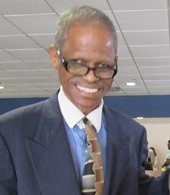KCK man persistently works on advancing civil rights hate-crimes enforcement
Window on the West
Opinion column
by Mary Rupert
The Rev. Wheeler Parker, in the Kansas City area recently for a church conference, was surprised when he heard on the news that an accuser of Emmett Till had changed her story.
Parker was a cousin of Emmett Till who went on the train with him from Chicago to Mississippi in 1955 to visit relatives. While at a store in Mississippi, Emmett Till allegedly whistled at a white woman. The news that the woman recanted her statement that Till grabbed her came out earlier this year.
Till, 14 years old at the time, was the victim of a lynching, brutally kidnapped and murdered. The Emmett Till death is considered to be one of the incidents that launched the civil rights movement in America. Parker was a teenager with Emmett at the time the woman originally told authorities that she had been assaulted, and some are wondering if the decades-old case now can be solved.
“Of course, it was good news for me to hear,” Parker said in an interview during his visit to Kansas City. “Now people can see Emmett Till in a different light than 60 years ago.”
For 60 years, some people thought that Emmett “got what he deserved,” but now it turns out that the woman lied, he added.
“Now America knows the truth – he did nothing to assault her,” Parker said. “So we’re glad to get that closure.”
Maybe, he added, if they can get that information from her, the authorities can get more information on the case from her. Most of those sorts of cases are never solved, and some people in the past have got away with crimes, he said. He and some others in the case support immunity for the woman in exchange for her information.
The woman in the case is now in her 80s, and the others involved in the Till case are senior citizens, as well.
A minister in the Pentecostal Church of God, Parker said people are called to forgive. However, he added that “we can’t afford to forget.”
Besides sparking the civil rights movement, the Till case greatly affected all the individuals involved. Till’s mother went back to school, got her master’s degree and dedicated her life to doing good because of what happened to her son, he said.
“It changed me, I became a minister,” Parker said. He dedicated his life to doing good, “because you can never forget.”
Parker called for more outreach on civil rights issues on the part of the clergy. “We’ve got to have some outreach among pastors about what’s happening to our people,” Parker said.
With the Till Bill 2 – the Emmett Till Unsolved Civil Rights Crime Reauthorization Act of 2016 – that Kansas City, Kansas, human rights activist Alvin Sykes has been working on, a mechanism has been set up to investigate cold civil rights hate crimes. Parker credited Sykes’ work in getting the bill passed last year.
Parker said this seeking after justice is Sykes’ calling in life. “This is his area of expertise,” Parker said. “He has a fire in his belly.
“I tip my hat to him,” Parker said. “He doesn’t give up.”
Said Sykes, “The poison of Emmett’s death didn’t overcome him (Parker); he used it for a very positive life.”
The changing landscape

The landscape is changing in different ways for Sykes and his efforts to solve old civil rights hate crimes in America.
Sykes, a human rights activist in Kansas City, Kansas, who is president of the Emmett Till Justice Campaign, plans to meet with U.S. Attorney General Jeff Sessions, an Alabama Republican, on Tuesday, March 28, in Washington, D.C., to discuss implementation of the Till Bill 2 at the Justice Department.
His work was not completed when the Till Bill passed Congress – it also needs to be implemented by the administration, which now has changed.
Sykes said he is asking the Justice Department to prioritize the Till Bill 2, and he wants to work with the attorney general’s office in developing a strategy for its implementation. Before, he said, there wasn’t much coordination between those working in the field and a strategy of how to implement it.
The main goal of the March 28 meeting is to open the lines of communication, he said. Some real issues may be discussed after the chief assistant attorney general for civil rights is appointed, he added.
Sykes is not just working on legislation in Washington, D.C., however. He also was working recently with State Sen. David Haley, D-4th Dist., on Senate Bill 128 in the Kansas Senate. This bill could double the penalties for hate crimes. The bill has been introduced in previous years and had its third hearing this year.
With a possible hate-crime link to a recent shooting in Olathe, Kansas, there was renewed interest in this bill, according to Sykes. He said since most of the acts of bias-motivated crimes are not murders, but are lesser crimes such as vandalism or assault, a lot of times they are not prosecuted. By increasing the penalties for these crimes, it makes the clear statement they won’t be tolerated, he said. He’s working on other bills, as well.
For Sykes, much of his effort is all about finding the truth, and getting closure, after so many years.
“He has no ulterior motive,” Parker said. “He just wants to see.”
To see an earlier story, visit https://wyandotteonline.com/civil-rights-till-bill-reauthorization-passes-congress/.

